(Returning to Tonga through closed borders, Cindy’s Take)
Ever since the Tongan international borders closed due to COVID in March, 2020, we have been trying to find a way to get back to our boat Cool Change that we left there on the hard in November, 2019. We had just planned for a short visit back to the States during Tonga’s cyclone season, and instead were stranded for more than two years away from what had been our home for the most part of the previous five years.
Our unsuccessful attempts to find a way back to our boat included joining a small Facebook group of people in the same predicament as we were in, in the same boatyard in Vava’u. Mostly those discussions revolved around finding someone already in Vava’u who could prep our boats for departure and then someone else in Tonga who was willing and able to sail away from Tonga, knowing that they likely wouldn’t be allowed back in. We weren’t really interested in that option at first because Rick had set his mind on doing some maintenance items himself before we departed.
But as time passed and the Tongan borders didn’t open, while almost all the other surrounding island countries did open, the option of having someone take our boat out became more attractive. Unfortunately, simultaneously, the opportunities for finding someone still in Tonga to do so, diminished. At least two boats in the boatyard were successful in doing so, but they probably exhausted the list of all potential skippers willing to leave.
By the December of 2021, Tonga had vaccinated nearly all its population, without a single reported case of Covid in the entire country, but their borders remained closed. It was as though they believed they could actually completely escape the effects of Covid, and would keep the borders closed until the virus was entirely irradicated from planet Earth. But then a huge volcanic eruption shook their world in January, 2022, with a tsunami and gigantic volcanic dust cloud spreading 100 miles and causing death and destruction, especially near the principal island where the King lives. Rescue workers flooded in from countries throughout the South Pacific, and brought Covid with them. So two years after the rest of the world faced the horror of Covid, Tonga followed suit.
Meanwhile, Fiji, French Polynesia, New Zealand and Australia all opened their borders, or announced a date in the near future when they would do so. Rumors had it that Tonga may open their borders as early as July, but as the summer approached, the rumors extended to November and perhaps longer.
We therefore set about trying to find someone to contact who could sympathize with our situation and help us overcome the border closures to get in anyway. We knew of at least two foreign nationals with boats in Tonga who had managed to do so somehow, but others had failed. Our contacts in Tonga said we needed approval from a Tongan governmental agency called MEIDECC, but they couldn’t give us a specific contact. Several times over the last year we contacted the American consulate in Fiji, whose jurisdiction also extends to Tonga, mostly not getting a response at all, or if we did, they simply said, sorry, the borders are still closed to foreigners. But finally, after much persistence, Rick got an email response from the American consulate in Fiji, indicating that we should contact the Tongan embassy in San Francisco. So Rick emailed them, but got no response.
I (Cindy) felt we needed to step up our efforts. We had been back in the states so long that it was becoming harder and harder to pull ourselves away from local commitments in order to focus exclusively on getting back to Tonga. We accepted an invitation in May to float down a wilderness river in Utah for 10 days, and we had reservations to go RV camping with family after Memorial Day. So I suggested to Rick that the camping trip should be the last commitment we made, and after that, we should do whatever needed to be done to get on a flight to Tonga.
So a day or two after we got back from the camping trip, on June 8, I decided I would call the Tongan Consulate in San Francisco and ask to set up an appointment to discuss our need to return to Tonga, and find out exactly what we needed to do to make it happen. We were ready to drive down the two hours to get to the meeting, if that is what it took to get someone’s attention. On my first call, I left a message but got not reply, so I kept calling. Finally, I got through to the person who answered the ”operator” line.
I didn’t say much except that I wanted to set up an appointment to discuss how my husband and I could arrange to get back to our home in Tonga. To my great surprise and delight, she responded, ”when do you want to go?” I told her as soon as possible, to which she replied that there was a repatriation flight from Fiji to Tonga scheduled for June 30, and we would have to leave the US on June 28 to make the connection. Next, she wanted copies of our passports, and instructed us to go online and complete the application for repatriation on the Tongan website. We had already done so earlier, but we did it again. Then, she explained that she would soon be sending to Tonga, the list of people’s names she was recommending for the repatriation flight, and expected a confirmation by the end of the week. Once she got the confirmation, she sent us two very impressive-looking letters with the Tongan government colored seal. The letters confirmed that the Tongan government had approved our one-way passage to Tonga, and asked that we be given every courtesy in aiding us in our passage.
Rick and I were ecstatic. We couldn’t believe it. After more than two years of just biding time till we could get back to our precious boat, it looked like it could actually happen!
But that meant we had to shift gears, and quickly. By the time we got what we thought was the go-ahead, we had only two weeks to shut down our lives in the US and prepare for our return to the boat. That meant everything from discontinuing garbage pickup, wifi service, TV subscriptions, etc. to renewing subscriptions for emergency medical insurance while abroad, satellite devices, etc. , many of which couldn’t be activated anywhere but in the US. Over two years ago before Covid hit, we had packed about 200 pounds of our return supplies that were still sitting in a closet ready to go, but then we found out that our limit would be only be 132 pounds. What to leave behind?
That wasn’t the end of the story as far as getting permission to re-enter Tonga, however. I began to realize as I waited for confirmation from the Consulate of each next step in the process, that the kind and patient woman i was working with was a one-woman show.
She seemed to be working entirely alone and had probably created individual relationships with each potential passenger, like she had with me. I received no group emails – l suspect she was having individual conversations with each passenger for each step in the process – quite a time-consuming method of coordination. I actually only confirmed that each next step in the process had been completed by calling or emailing her, rather than waiting for her to contact me. Even the way to contact her seemed odd: I had to send her money at one point, and she had me send it to a Venmo account with her name only, and no reference to the government of Tonga. Similarly, her email was her name only, at a gmail account. I just had to trust this wasn’t all a scam! Good thing I did, though, because she came through in the end!
Speaking of which, I thought everything was going smoothly until she said that she now had authorization from Tonga for me to contact Fiji Airlines to book the Fiji to Tonga flight. She gave me a credit card authorization form to send to two specific addresses at Fiji Airways. The form intentionally omitted four digits from the credit card number for security reasons, so someone would have to call me to fill in the last four digits. I sent in the form and waited for the call, but instead, I received an email response from one of the Fiji Airways addresses saying that we couldn’t be booked on the final flight because visa approval hadn’t been received from MEIDECC, and besides, tourists weren’t allowed in yet.
I panicked. We had already booked and paid for our flights from Sacramento to LAX, and from LAX to Fiji. It was less than a week before our departure. I contacted the Tongan Consulate again for assistance. The Consulate then asked me for copies of our visas (stamped in our passports) from the last time we were in Tonga in 2019. As backup, she also asked for boat papers that proved our boat was in Tonga. Another day went by, with Rick and I sitting on pins and needles until I finally got confirmation from Fiji Airways that MEIDECC had approved us. Fiji Airways then asked me to send in the Credit Card Authorization Form again, along with another copy of our passports that had already been sent to them.
The next day, I put my phone in my fanny pack and wore it around the house all day so I wouldn’t miss the call from Fiji Airways asking for the last missing digits of my credit card number. No call. I emailed everyone I could to ask why they hadn’t contacted me yet. I finally called the consulate and she explained that everyone at Fiji Airways was probably watching the parade celebrating a national rugby win! She said not to worry, they work late and would call me eventually. As Rick and I were falling asleep in front of the TV at home about 10 pm on Thursday night, only 4 1/2 days before we were scheduled to depart for the airport, I got the call.
You would think that would be the end of the surprises, but you would be wrong. We had unavoidable plans to visit Rick’s mom in the San Francisco Bay Area to say goodbye on Friday, and then over the weekend, to help prepare for and help host the Celebration of Life in San Francisco for my dearest friend who had passed away. Since we were driving back home through Sacramento on Monday and departing on Tuesday, we scheduled our required COVID Rapid Antigen Tests at a free location on our way home. After we got home, I sent the “Negative” results to the Tongan consulate as requested. She responded that the test had to be done on our day of departure, not before.
Meanwhile, Rick and I reconsidered our flight schedule that included arriving in LAX at 7:30 p.m. for an 11:55 p.m. connecting flight departure. Normally that would have been plenty of time, but I had just read an article by a flight attendant describing the absolutely horrible conditions of air travel right now, including that a huge number of flights are being cancelled, flying in the morning is your best bet, and leaving time for flight delays and cancellations is essential. So we rebooked our flight to arrive by noon in LAX. That meant a 12 hour layover in LAX, but we hoped to find our way to the United Lounge to pass the time more comfortably.
Booking a Covid test in LAX would have cost over $100, so I booked new appointments at our same Sacramento testing site on the way to the airport. I worried that might delay us getting to the Sacramento airport on time, but I had no choice if I wanted free tests.
Rick’s sister Linda got us to the airport on time. The flight from Sacramento to LAX went smoothly, and we lucked out that our arrival terminal was the same terminal where the United Club Lounge was located. Otherwise had we needed to go outside of security to fetch our bags before continuing to the Lounge, we wouldn’t have been able to re-enter security to get through to the Lounge because we couldn’t check our bags or get boarding passes until the Fiji Airways counter opened up much later in the afternoon. As it was, the United Lounge made arrangements for United baggage claim to hold into our bags for the day. We spent a relaxing day in the United Lounge, with free finger food all day and a glass of wine as we approached the evening.
When we finally were able to check in with Fiji Airways in the early evening, we faced another surprise: the reservations for two assigned aisle seats we had paid extra for, to endure the 10 hour flight in economy class with just a little less discomfort, had been cancelled. We were now scheduled to sit in a window seat and a middle seat. Although I had originally scheduled an aisle seat, I was ok with the window, but there was no way that Rick would tolerate a middle seat – he needed an aisle. After checking back over and over again with the same agent who made empty promises to try and find him another seat, another agent finally came to our rescue and found him an aisle seat, 14 rows away from one another in different cabins. So we each travelled that entire flight alone. That was ok, though. The flight was comfortable and we both got some sleep.
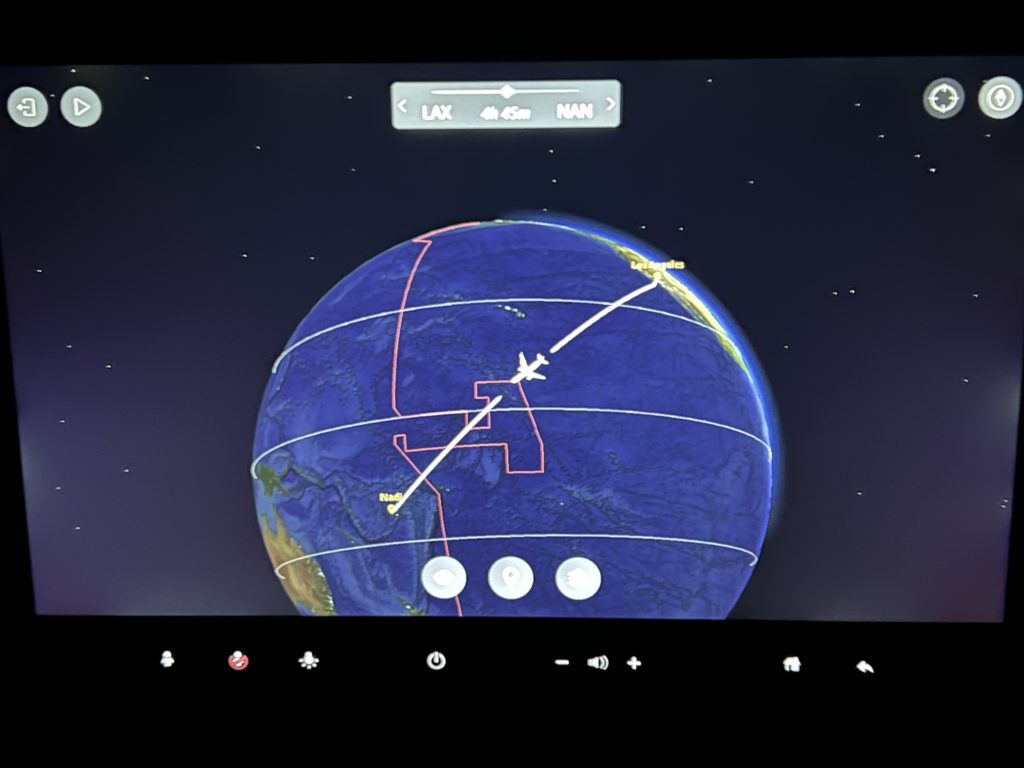
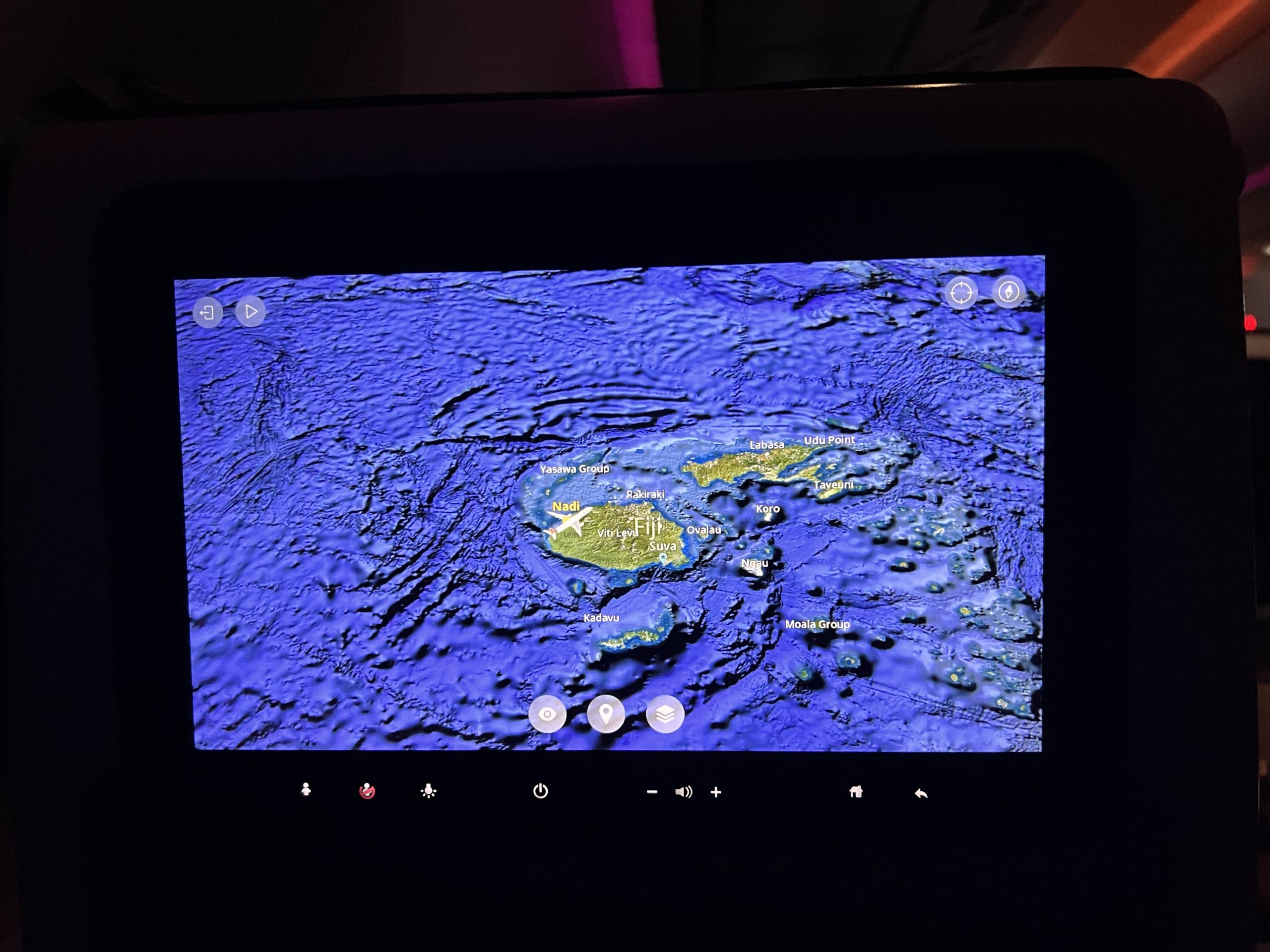
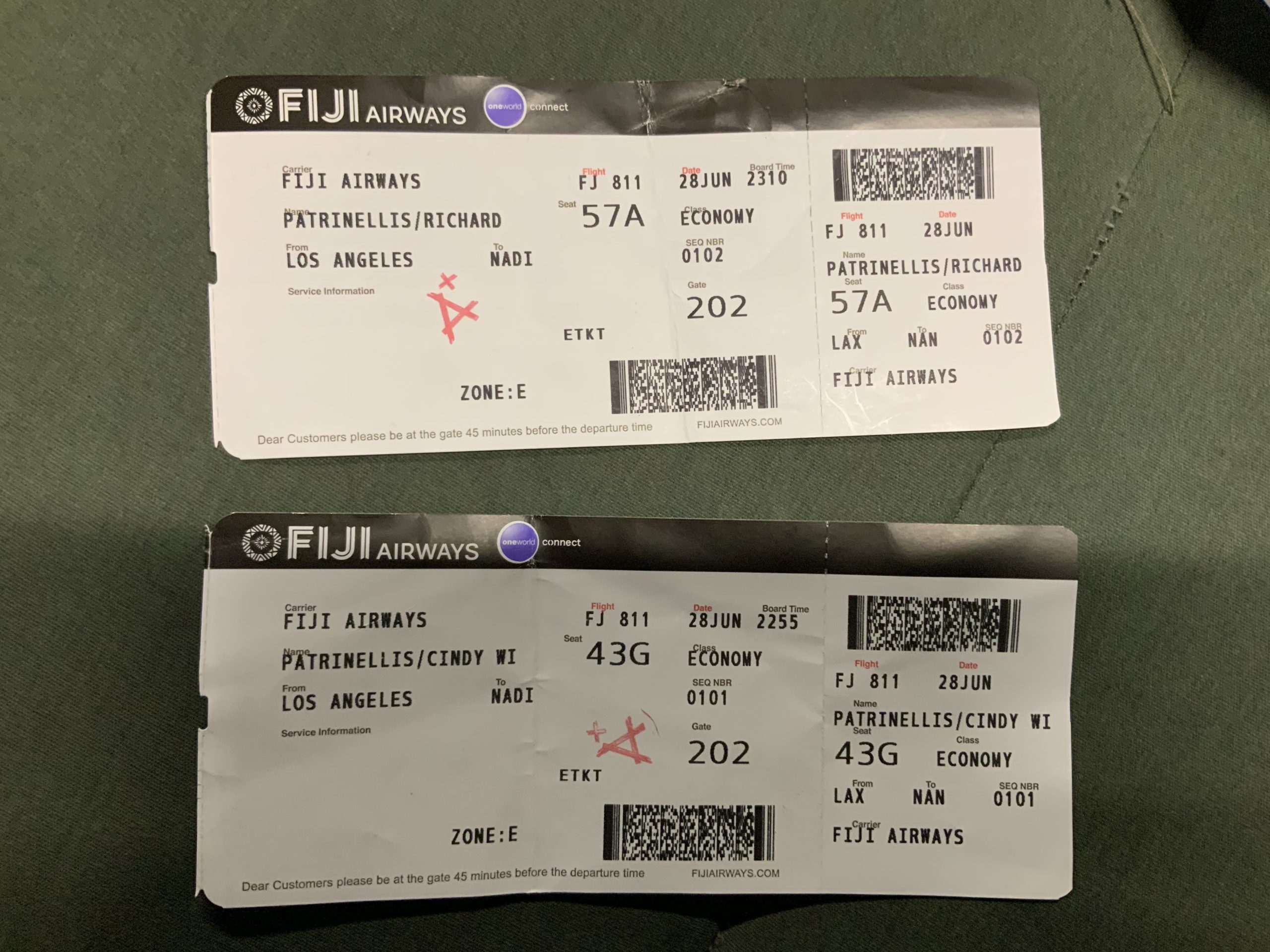
As we approached Nadi, I was given two forms to complete. One made it clear that absolutely no food whatsoever would be allowed in Fiji, not nuts, not fruits, not grains, not milk products, not meats, not flour, nothing. I debated with myself about the few insignificant luxuries I had in my pack that I was holding onto for our time in quarantine, but as Rick would later say, it wasn’t worth jeopardizing the trust an inspection agent might have in us by holding onto something that was clearly prohibited, not to mention any penalties they might impose. So on the plane, I left a half-bag of dried fruit, an unopened bag of beef jerky, some raisins, and even my box of Starbucks Instant decaf, something I would never be able to replace in Tonga.
Unfortunately, the form I was given requiring all food to be tossed out before screening by Fiji Customs was not intended for passengers in transit like I was. There was no searching of my bags whatsoever, and I went straight into the waiting room for the flight to Tonga. Oh how I wished I had kept my decaf!
We had a several hour layover in Nadi Airport in Fiji before boarding the Government Charter flight to Tonga. As soon as I arrived in Nadi, I realized my mistake in not having packed an extra top in my carry-on. I had been traveling for nearly 24 hours and I really needed to change, even after having washed up as best I could in the Nadi Airport restroom. There were several duty-free shops in the airport, so I found an inexpensive Fiji t-shirt to feel fresh again.
While searching for the t-shirt, I saw the duty free liquor shop. I knew the normal liquor limits for entry to Tonga were 2.5 liters, but the Tongan consulate had sent me, almost as an afterthought, an email not addressed to me, that said that alcohol was not allowed on the plane to Tonga nor in quarantine. So I asked the flight attendants for the charter flight, and also the Duty Free shop, and they both concurred that there were no such limits on alcohol to Tonga except the 2.5 liter limit. That made me quite happy and I bought a bottle of rum. I thought to myself that if we were going to be stuck in a hotel room/prison for three days, with no food nor drink except what the government fed us, it would be nice to at least have a little shot of rum each night as the sun set.
When I got back to the lounge and told Rick about my discovery, he said he preferred a different brand of rum, which I was unable to locate. I told him to go buy it too, if he could find it. After all, we were allotted more than two bottles each, and we would eventually use it all since we would be in Tonga for quite a while. He went to buy it but then came back empty-handed and insisting I return the bottle I bought because there was another passenger at the counter who had received the email saying that alcohol was entirely forbidden. We discussed it with the flight attendant and the duty free shop, and they both said to buy it anyway, and the worst that could happen would be that the authorities would hold onto it until after the quarantine was complete. But Rick wouldn’t have it. He said he couldn’t believe that after all we had been through to get here, I would jeopardize our safe passage for just a little drink of rum. When he put it that way, I had to return it.
When we arrived in Tonga, everyone there to greet us was dressed in hazmat suits, donning gloves and masks. The immigration and customs stations were abandoned due to COVID concerns. We were instructed to pick up our own baggage, toss our passports into a cardboard box, and load ourselves into awaiting buses that were marked with red balloons to indicate potential contagion. The persons taking our names couldn’t understand our foreign names through the masks but didn’t want us to get any closer to them or help them find our names on the list. I felt like I was radioactive. Obviously, no one had any interest in knowing what we had in our bags.
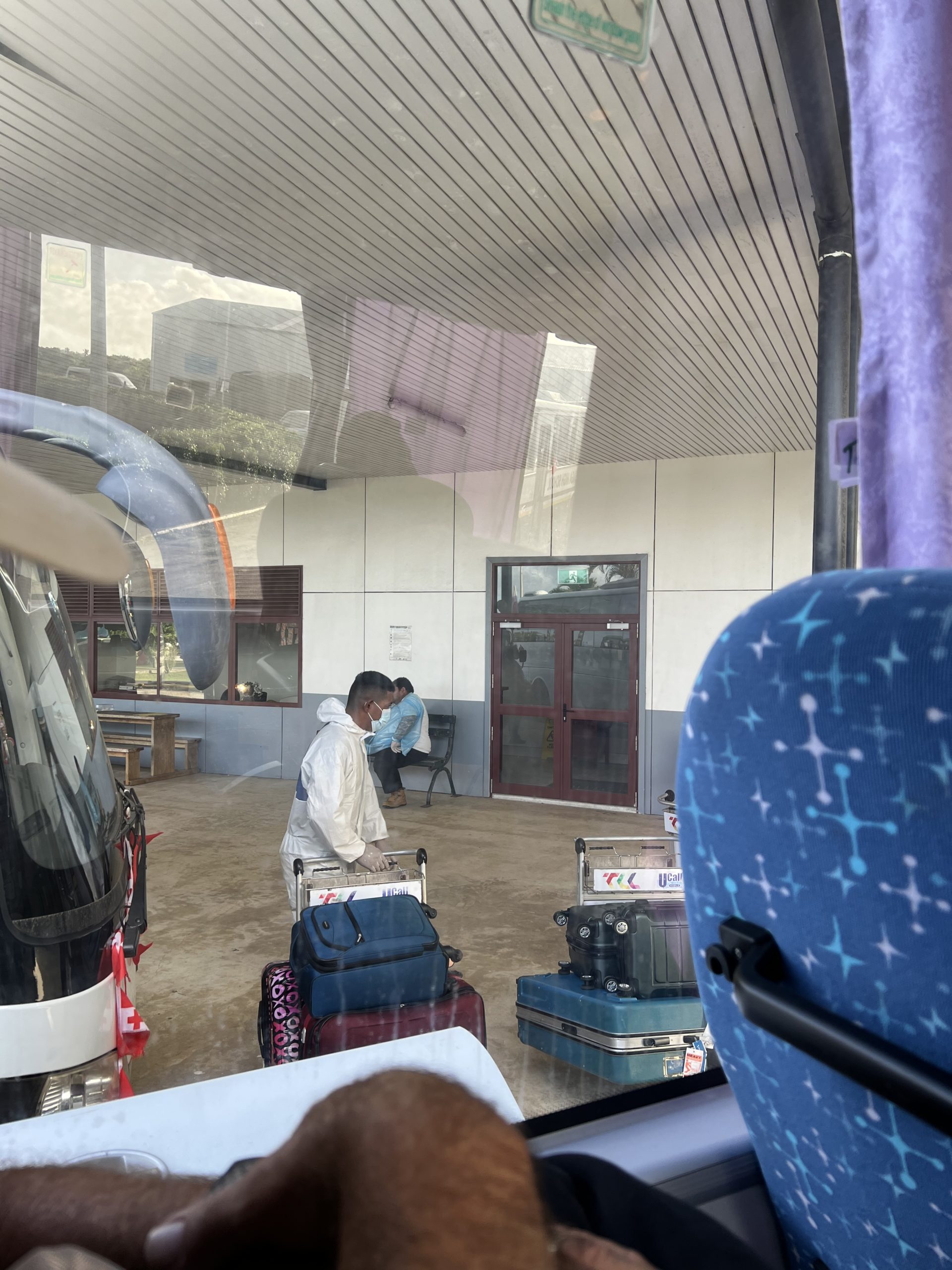
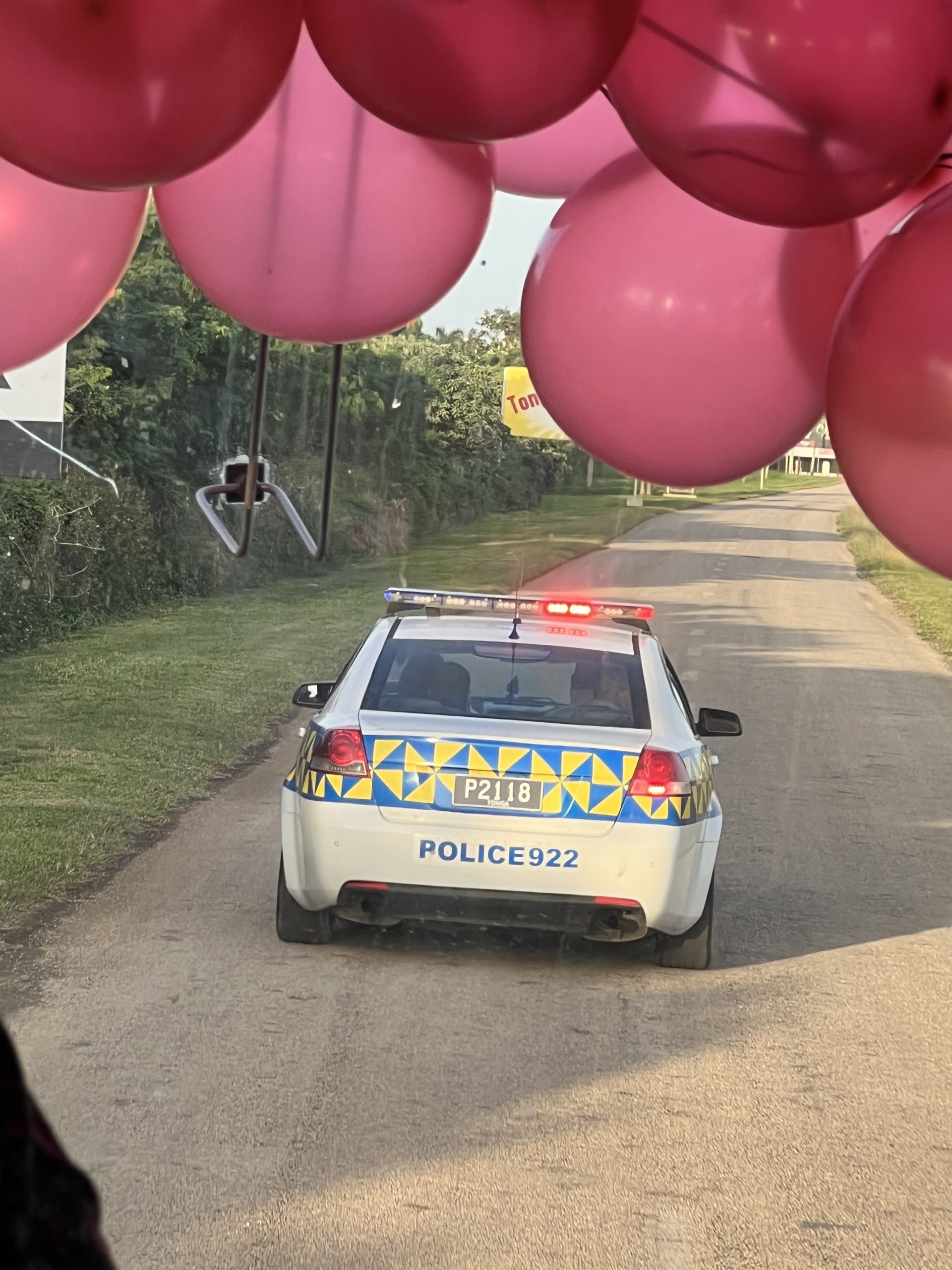
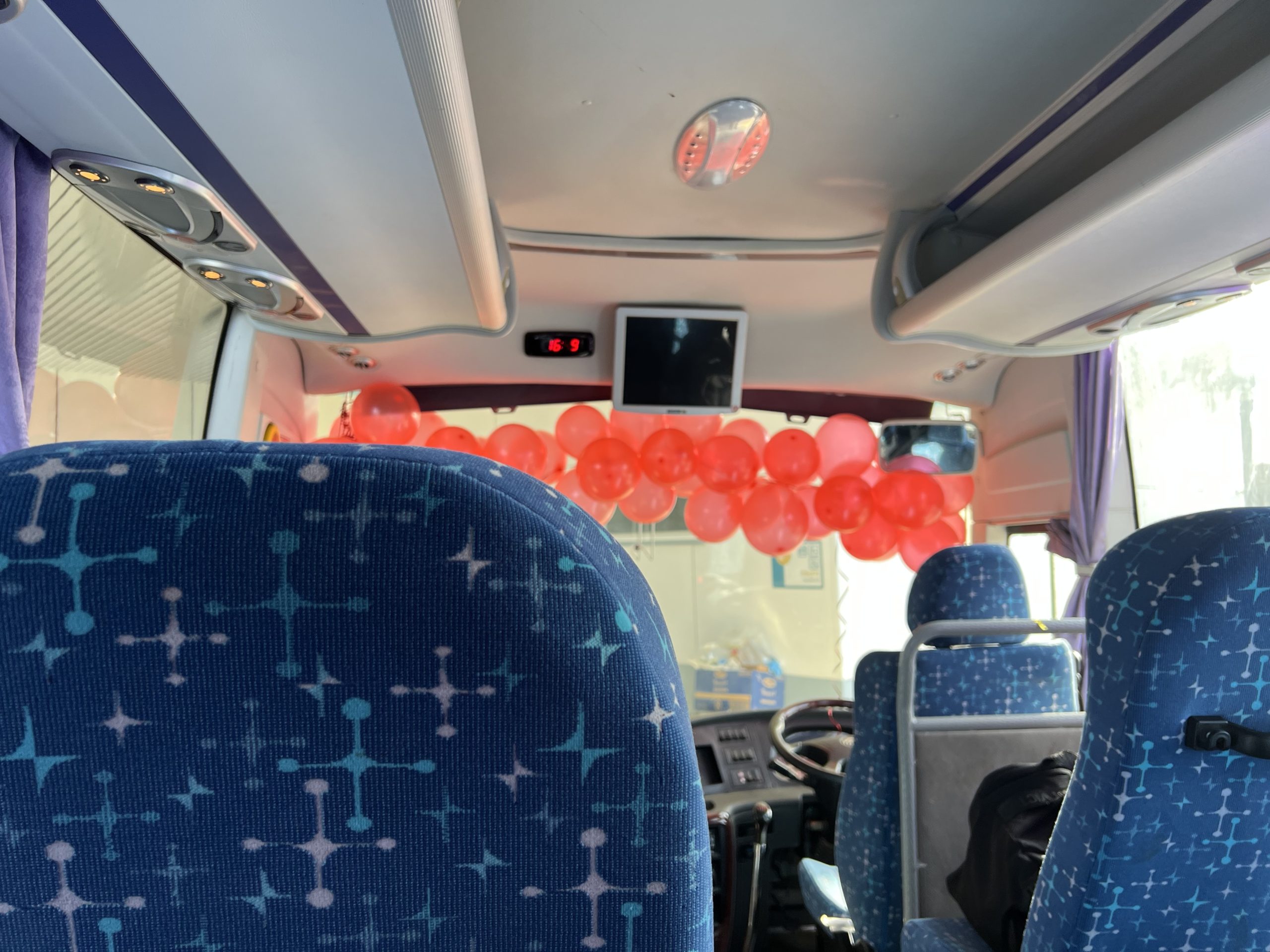
At the hotel, we were all dumped outside with our bags and then someone speaking Tongan explained we should line up to get our room number. Fortunately, a woman nearby took pity on us and translated. By this time I realized that if anyone was going to understand our names, I had to write them down. I did, but they still weren’t sure which was the last name and which was the first name. I couldn’t blame them because I had the same confusion with their names. They still couldn’t find us on their list, so they assigned us a room they thought was vacant. Our bags, meanwhile, were tagged with our room number, with the promise that they would be delivered to our room. When we got to our room, there was someone else’s name on the door, but no one there yet. I took the name down off the door and brought it to a staff member, who just tossed the paper and told me to go back to our room. Later, once we were settled in, the people whose names had been on the door originally, arrived to claim their room. We all apologized to one another and they left. I just hoped that this confusion wouldn’t extend to getting our bags, or getting back our passports when the time came!
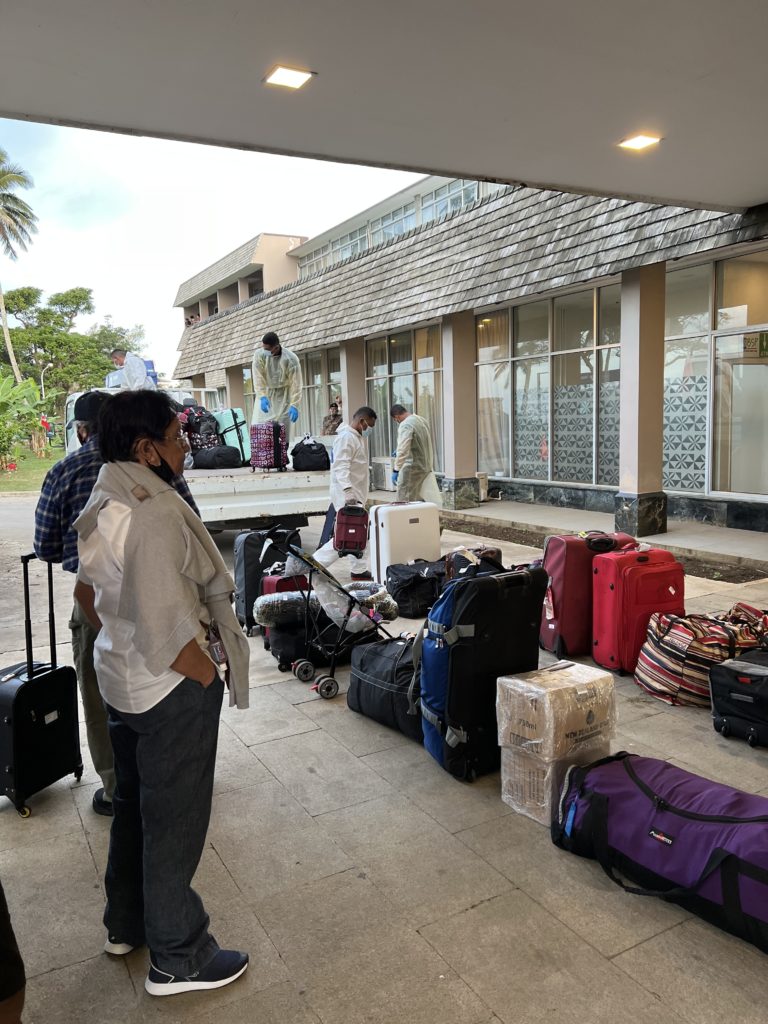
The reality hit us that while most Tongans can speak English, they speak Tongan when they are together, of course. And given that there haven’t been any foreigners in Tonga since the pandemic began, everyone is accustomed to speaking only Tongan now. With almost no foreigners in the country but us, we were returning to a different Tonga that we had left – perhaps a more authentic one, but also one where we were an exception, an anomaly.
We are now hopefully in the last day of quarantine, assuming our COVID tests, taken early this morning, come back negative. We were surprised by the quarantine hotel room. It is nothing fancy, but it has air conditioning, a balcony, hot water in the shower, and an electric tea kettle to make coffee with the instant Nescafé they supplied (I guess my teeth will eventually stop grinding as my body acclimates to caffeine again!). The food is ample and mostly edible although of uncertain origin – was that pork or chicken? Potato or Taro? Who takes catsup with their hard boiled eggs?
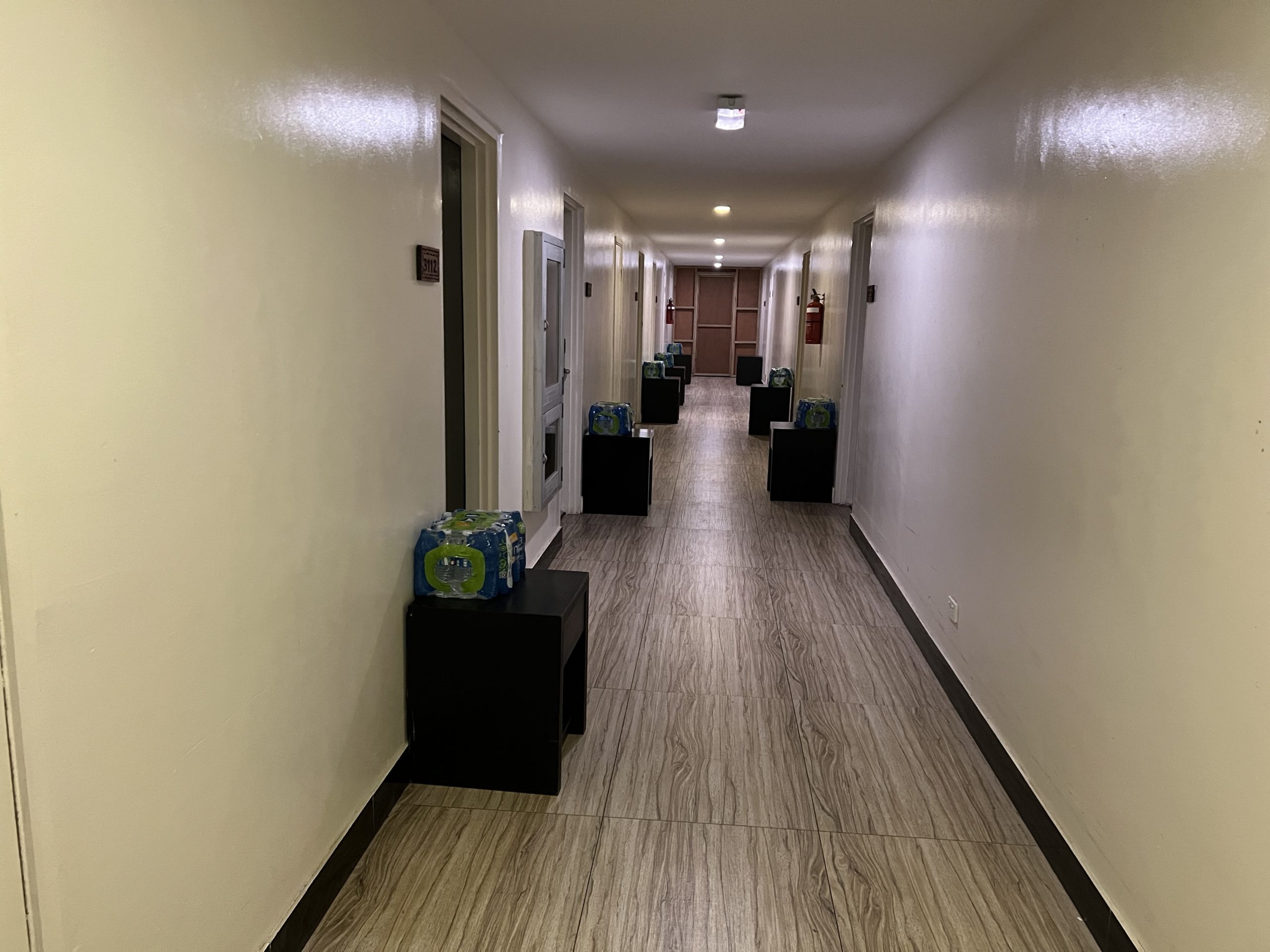
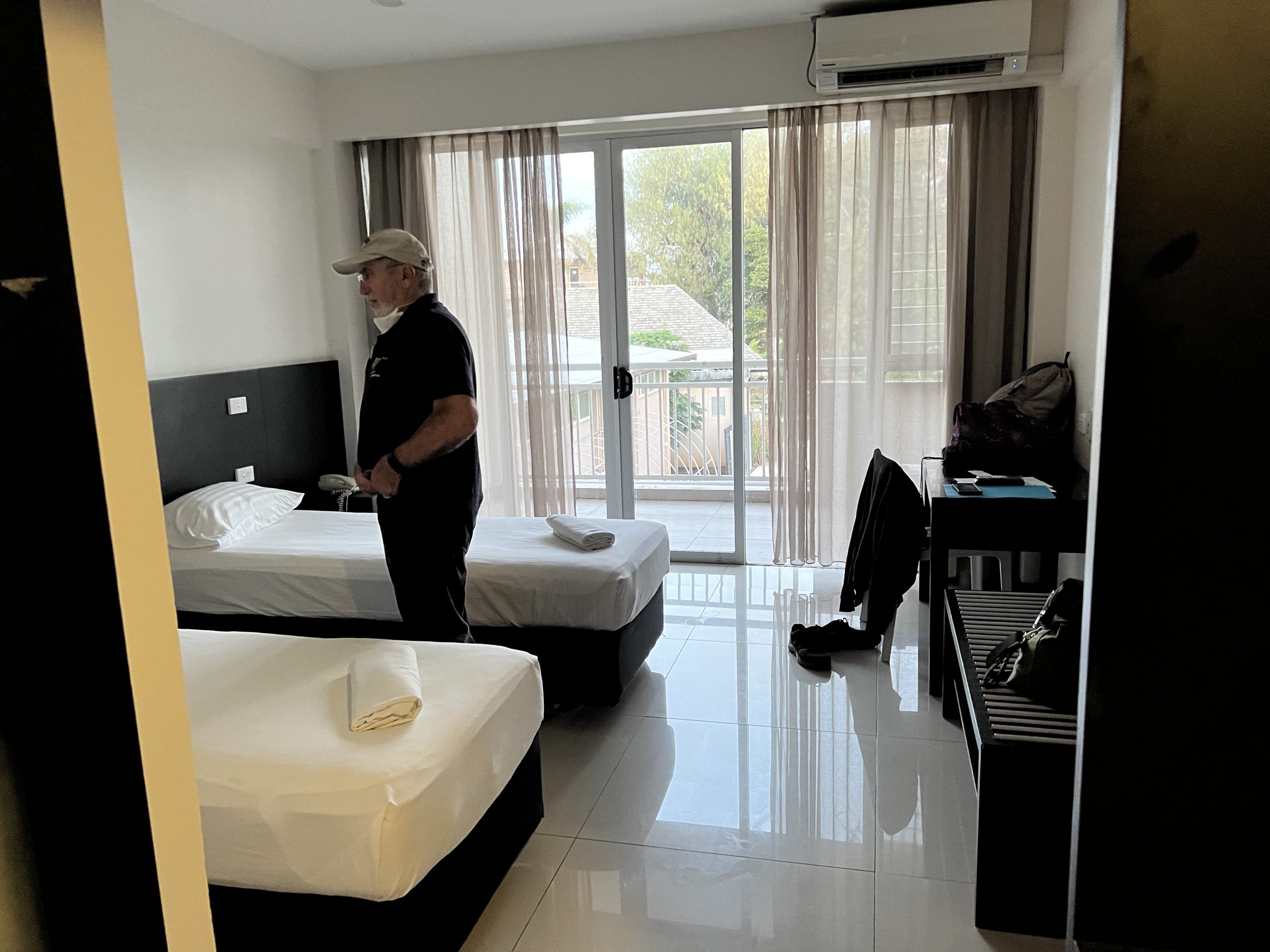
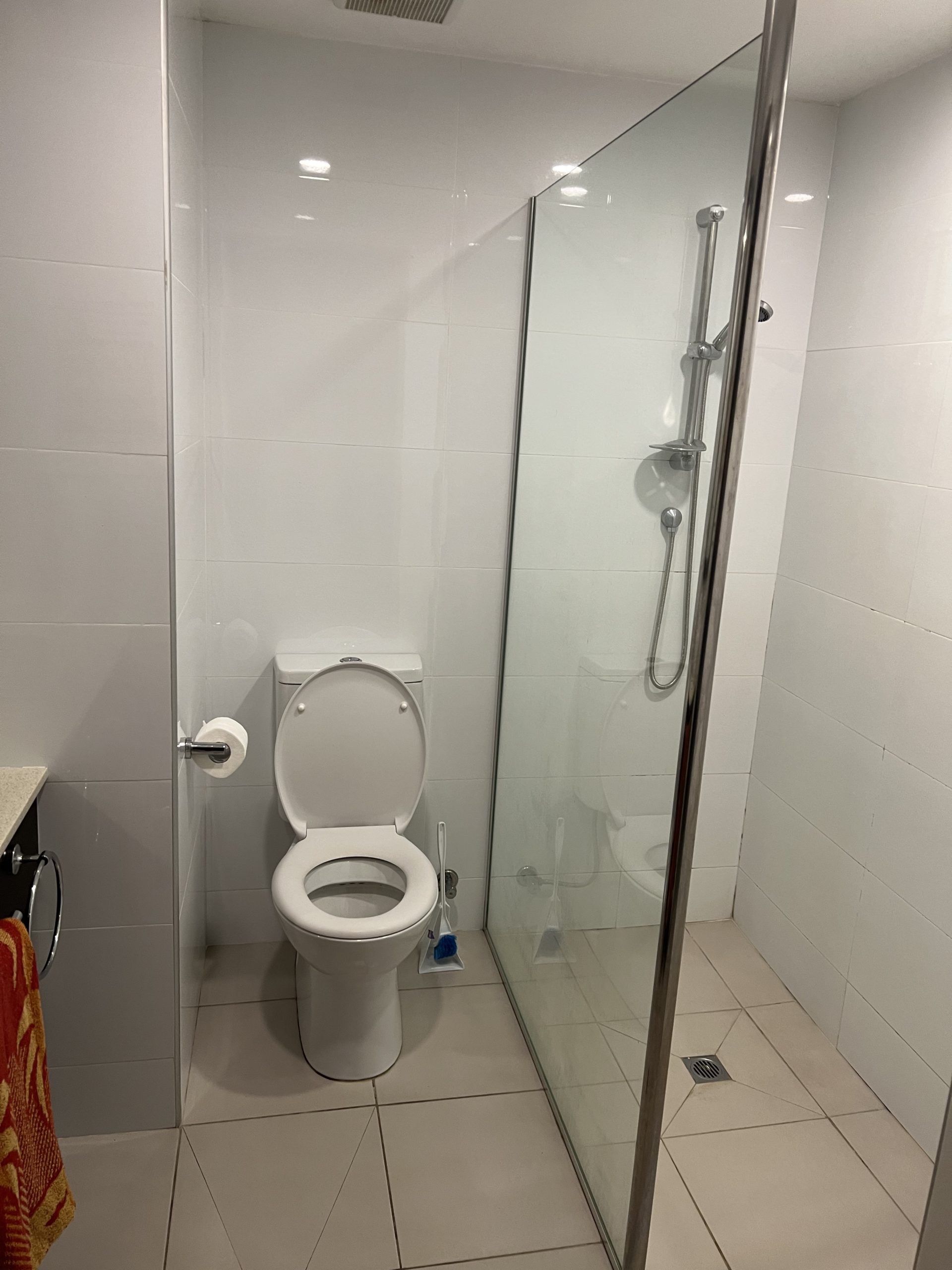
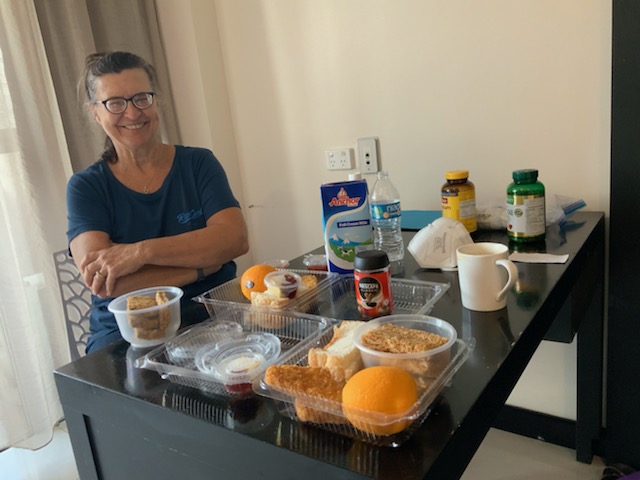
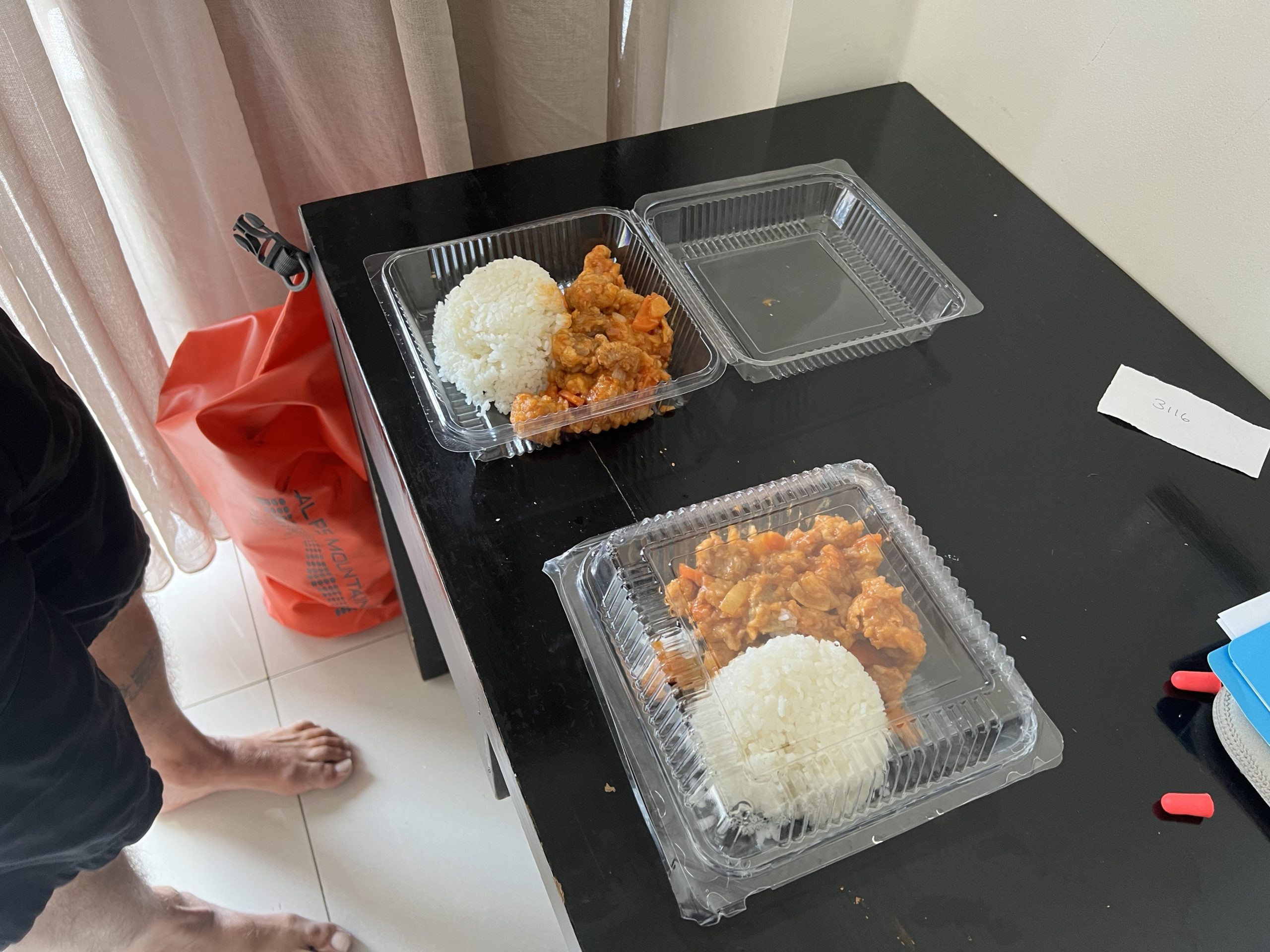
As we sit here in our quarantine room, our passports have been delivered to us, stamped with a 30 day visa. what a relief. The next step is to be notified we tested negative, to pay for the quarantine hotel. If that all goes well, we have found a little hotel nearby to stay in tonight, and we need to find an ATM to get cash to pay for our flight up to Vava’u tomorrow. A rental car we arranged will hopefully be waiting for us at the Vava’u airport, and a small studio overlooking the water will be ready for us in town while we recommission our boat. Cool Change is so close I can taste it! But as Rick says, the only way to approach this entire trip is just to focus on one step at a time. The entirety of the project has already been, and continues to be, just too much to fathom.
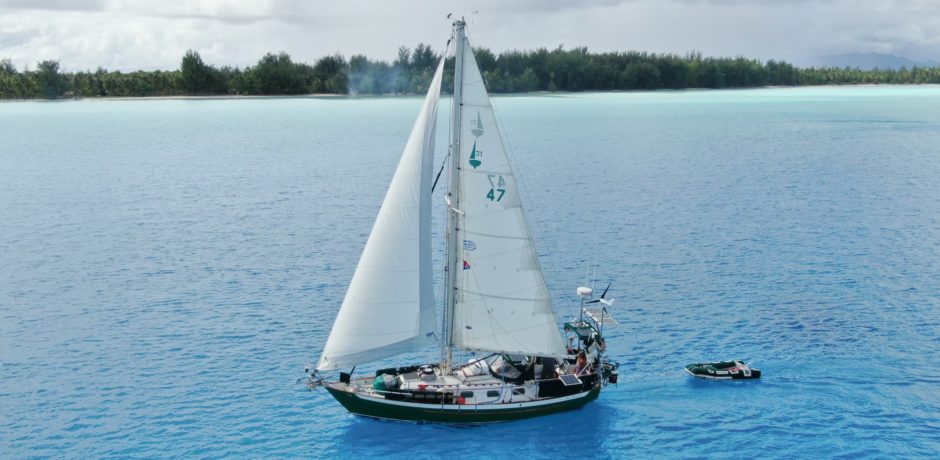
Amazing! Happy for you guys!!
Thanks, Rich!